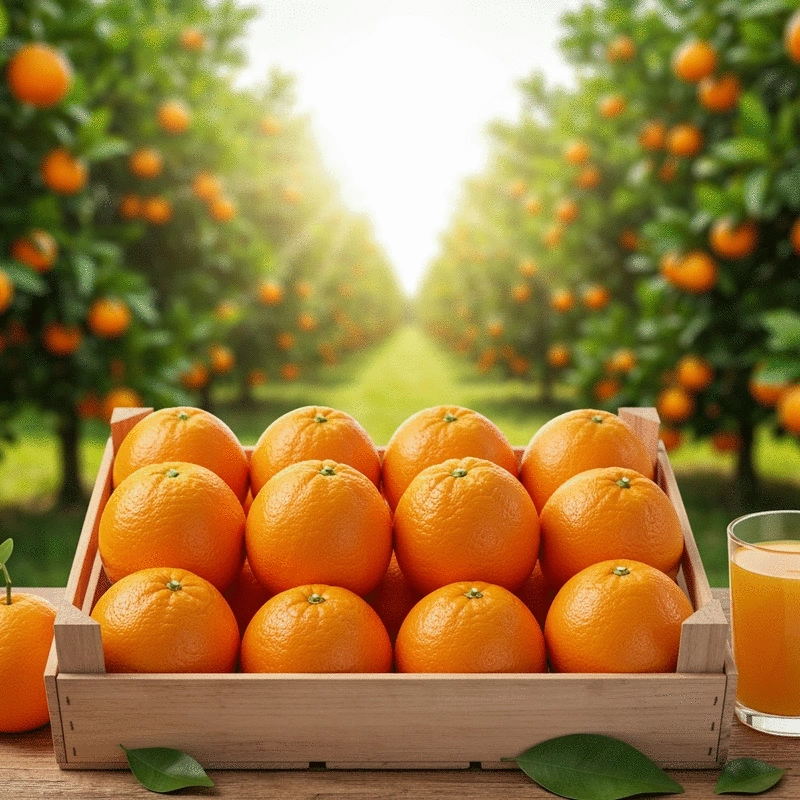Reducing Waste in Orange Production

Reducing waste in orange production is more than just a trend; it's a commitment towards sustainability and environmental stewardship. With the rising awareness around eco-friendly practices, understanding how to effectively manage waste in citrus agriculture is essential for producers today.
What You Will Learn
- Different types of waste in orange production, including harvest, processing, and packing waste.
- The environmental impacts of waste accumulation, including greenhouse gas emissions and water pollution.
- Practical steps for producers to reduce waste, such as conducting audits and integrating eco-friendly methods.
- The importance of sustainability for economic resilience and meeting consumer demand for environmentally-friendly products.
Orange Production Waste Management Overview
Understanding and reducing waste in orange production is crucial for environmental sustainability and economic resilience. The visual below highlights the primary sources of waste and their environmental impact. By implementing strategies like those discussed in our guide to sustainable orange farming in Australia, producers can significantly mitigate these issues.
Common Waste Types in Citrus Production
- Harvest Waste (damaged fruit)
- Processing Waste (pulp, peels)
- Packing Waste (excess materials)
Environmental Impact Categories
- Water Pollution
- Soil Degradation
- Loss of Biodiversity
Understanding Waste in Orange Production Processes
As a passionate horticulturist, I’ve seen firsthand the beauty of orange cultivation. However, it comes with its challenges, especially when it comes to waste management. Understanding waste in orange production processes is crucial—not only for the grower but also for the environment. By recognizing where waste originates, we can take meaningful steps towards sustainability.
Waste can manifest in various forms, from unused fruit to packaging materials. Each type of waste presents an opportunity for improvement and innovation in our practices. By focusing on reducing waste, we can lessen our environmental impact while enhancing our overall efficiency.
Why Reducing Waste Matters for Sustainability
Reducing waste is not just about improving profits; it’s a vital step towards achieving sustainability. Waste that ends up in landfills contributes to greenhouse gas emissions, which devastates our planet. When we minimize waste in orange production, we’re making a commitment to protect our environment and promote healthier ecosystems.
- Improving soil health through less chemical runoff
- Enhancing biodiversity by reducing resource consumption
- Building a sustainable future for generations to come
Taking these measures doesn't just help our environment—it can also improve our marketability. Consumers today are more environmentally conscious than ever, and they prioritize products that align with their values. For instance, many consumers actively seek out organic oranges and sustainable farming practices.
Common Types of Waste in Citrus Production
In the citrus industry, waste can be categorized into several types. Understanding these can help us devise effective strategies for waste reduction:
- Harvest Waste: This includes fruit that is damaged during harvesting.
- Processing Waste: By-products generated during juice extraction include pulp and peels.
- Packing Waste: Excess packaging materials that are often discarded.
Each type of waste represents an opportunity for improvement. For example, orange peels, often considered waste, can be repurposed into valuable products. This is where our journey into sustainability truly begins!
Environmental Impact of Waste in Orange Production
The environmental consequences of waste in orange production are significant and multifaceted. When organic waste decomposes in landfills, it produces methane—a potent greenhouse gas. Additionally, the unnecessary use of resources in production leads to higher carbon footprints.
- Water Pollution: Runoff from waste can contaminate water sources.
- Soil Degradation: Accumulation of waste can reduce soil fertility over time.
- Loss of Biodiversity: Excessive waste can harm local wildlife and ecosystems.
By recognizing these impacts, we can work towards minimizing them. At Orange Insights, we believe that every small change can contribute to a greater good. Let’s join hands in making our orange production processes more sustainable!
Pro Tip
Did you know? By leveraging your orange by-products, such as peels and pulp, you can create natural fertilizers and compost. This not only reduces waste but also enhances soil health, promoting a more sustainable orange production process. Consider setting up a simple composting system to transform your waste into valuable resources for your garden!
Summarizing Key Takeaways for Waste Reduction in Orange Production
As I reflect on the practices within orange cultivation, one thing stands out: the importance of sustainability in citrus agriculture is paramount! Through efficient waste management, we can enhance both the environment and our production processes. By adopting sustainable practices, we not only benefit our immediate surroundings but also contribute to a healthier planet for future generations.
Waste reduction is not just an operational necessity; it's a pathway to creating a more resilient agricultural system. It’s essential for farmers to recognize that every effort counts in our shared journey towards sustainability.
The Importance of Sustainability in Citrus Agriculture
Embracing sustainability in citrus agriculture allows us to foster healthier ecosystems and improve our crop yields. Here are some key reasons why sustainability matters:
- Environmental stewardship: By reducing waste, we minimize our carbon footprint and conserve valuable resources.
- Economic resilience: Sustainable practices often lead to cost savings and new revenue opportunities through valorization of by-products.
- Consumer demand: More buyers are looking for environmentally-friendly products, making sustainability a competitive advantage.
As a community of orange cultivators, we must unite in our efforts to implement sustainable practices that not only benefit our farms but also resonate with our customers. It’s encouraging to see how small changes can lead to significant impacts!
Practical Steps Forward for Producers
For producers looking to embark on the journey of waste reduction, here are some practical steps to consider:
- Conduct a waste audit to identify areas for improvement in your production processes.
- Integrate eco-friendly extraction methods to maximize the utilization of orange peels and other by-products.
- Collaborate with local businesses and communities to share resources and knowledge on sustainable practices.
Taking these initial steps can help pave the way towards a more sustainable future in orange production. Remember, it’s about making incremental changes that collectively lead to a bigger impact!
Engaging with the Community: Join the Sustainability Movement
At Orange Insights, we believe that community engagement is vital for the sustainability movement. We encourage everyone to get involved and share their experiences and ideas regarding waste reduction, much like sharing growing oranges in your backyard tips.
Let’s work together to inspire change and promote sustainable practices in our local areas!
Get Involved: Share Your Experiences and Ideas
We invite you to connect with us by sharing your journey in sustainable orange cultivation. Here’s how you can get involved:
- Join online forums or social media groups focused on sustainable agriculture.
- Share your success stories or challenges you have faced in waste reduction.
- Attend local workshops or community events to exchange ideas and strategies with fellow growers.
Every voice counts in this movement, and we would love to hear from you! Your insights can contribute to a larger pool of knowledge that benefits everyone in the orange farming community.
Resources for Further Learning on Sustainable Practices
To support your journey towards sustainability, here are some resources you can explore:
- Books and eBooks on organic farming and waste reduction techniques.
- Websites and blogs dedicated to sustainable agriculture practices.
- Online courses or webinars that provide deeper insights into eco-friendly methods.
These resources can equip you with the necessary tools and knowledge to implement effective waste reduction strategies in your orange production.
Consumer Awareness and Its Role in Waste Reduction
Lastly, consumer awareness plays a critical role in encouraging sustainable practices in orange production. When consumers are informed about the environmental impacts of their choices, they are more likely to support sustainably-grown products.
As a community, we can enhance this awareness by:
- Providing educational content about the benefits of sustainably grown oranges.
- Engaging with customers through workshops and tastings that highlight the value of sustainable practices.
- Encouraging feedback from consumers to understand their preferences and concerns.
By fostering a culture of awareness, we can help drive demand for sustainable oranges and promote a healthier planet!
Recap of Key Points
Here is a quick recap of the important points discussed in the article:
- Understanding the various forms of waste in orange production is crucial for sustainability.
- Reducing waste not only helps the environment but also enhances marketability by appealing to eco-conscious consumers.
- Common types of waste in citrus production include harvest waste, processing waste, and packing waste.
- Implementing eco-friendly practices can lead to significant improvements in soil health, biodiversity, and economic resilience.
- Engaging with the community and sharing knowledge is essential for promoting sustainable practices in orange cultivation.
Frequently Asked Questions About Waste Reduction in Orange Production
- Q1: What are the main types of waste generated in orange production?
- A1: The main types include harvest waste (damaged fruit), processing waste (pulp, peels), and packing waste (excess materials).
- Q2: Why is reducing waste important for sustainability in orange farming?
- A2: Reducing waste minimizes greenhouse gas emissions, protects the environment, promotes healthier ecosystems, improves soil health, enhances biodiversity, and meets consumer demand for eco-friendly products.
- Q3: What are the environmental impacts of waste from orange production?
- A3: Environmental impacts include water pollution from runoff, soil degradation due to waste accumulation, and loss of biodiversity harmful to local wildlife and ecosystems.
- Q4: What practical steps can orange producers take to reduce waste?
- A4: Producers can conduct waste audits, integrate eco-friendly extraction methods, and collaborate with local businesses and communities to share resources and knowledge on sustainable practices.
- Q5: How can consumers contribute to waste reduction in orange production?
- A5: Consumers can support sustainably grown oranges, stay informed about the environmental impacts of their choices, and provide feedback to producers on their preferences and concerns.
Popular Posts
 What if a little seasonal care could transform your orange trees from ordinary to extraordinary? Und
What if a little seasonal care could transform your orange trees from ordinary to extraordinary? Und
 Reducing waste in orange production is more than just a trend; it's a commitment towards sustainabil
Reducing waste in orange production is more than just a trend; it's a commitment towards sustainabil
 Have you ever considered how a simple fruit like an orange can elevate your summer desserts? With th
Have you ever considered how a simple fruit like an orange can elevate your summer desserts? With th
 Are you ready to make a difference with every bite you take? Embracing organic oranges not only tant
Are you ready to make a difference with every bite you take? Embracing organic oranges not only tant
